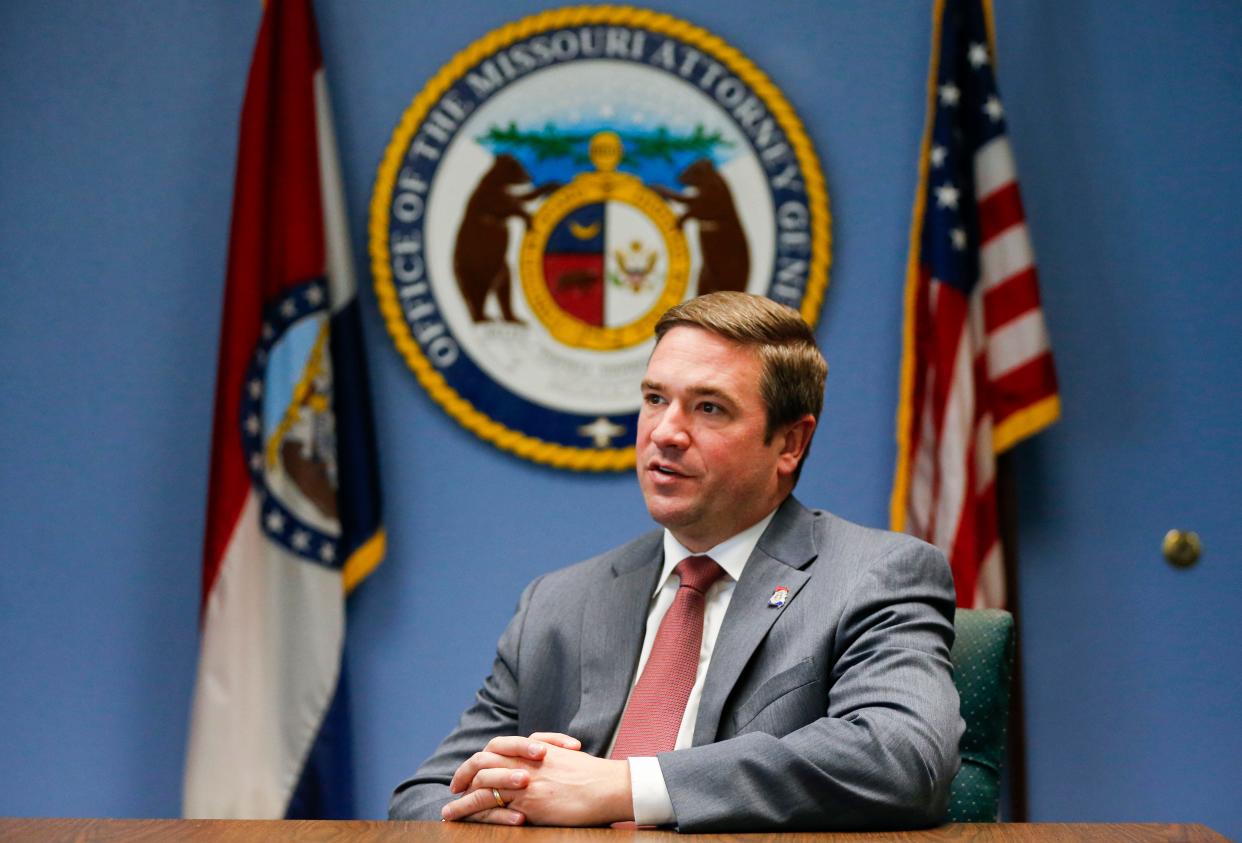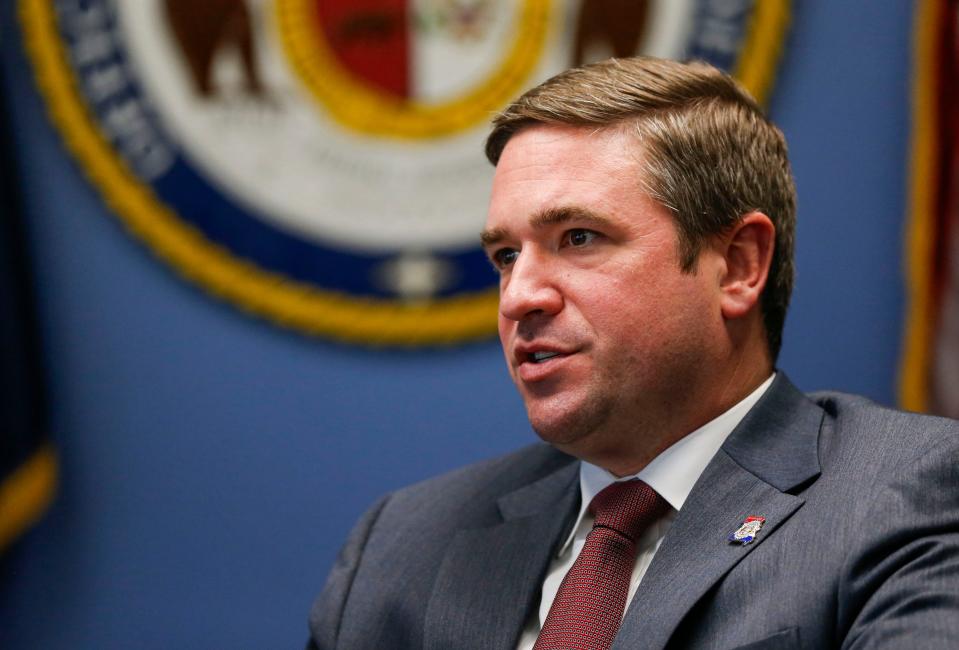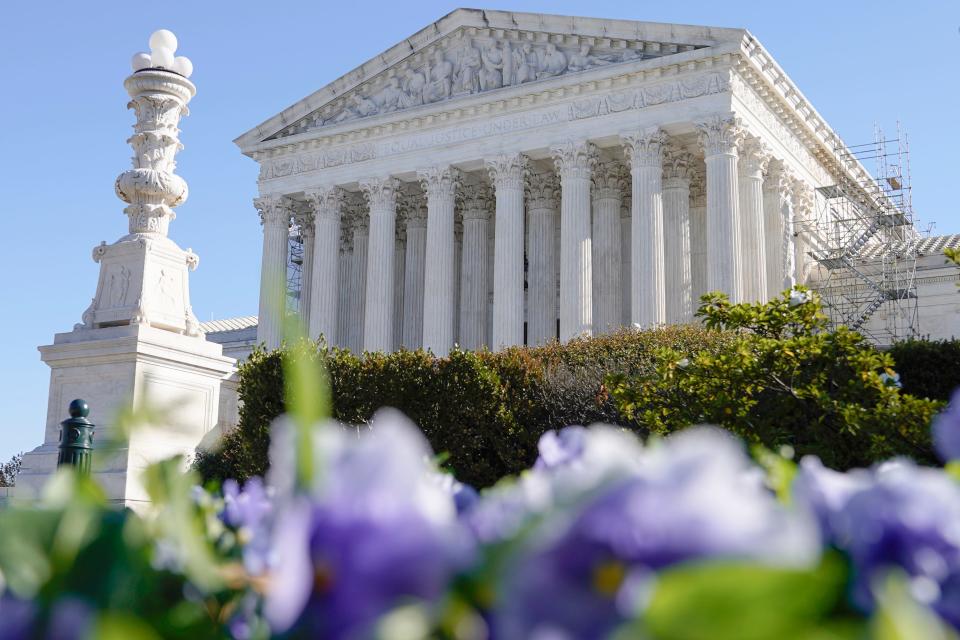U.S. Supreme Court will hear Missouri case challenging federal influence on social media

- Oops!Something went wrong.Please try again later.
A lawsuit challenging the federal government’s ability to influence information shared on social media platforms will be heard by the U.S. Supreme Court, and it originated in part with the Missouri Attorney General’s office.
Under former state Attorney General Eric Schmitt, who now serves as a U.S. Senator, a lawsuit was filed with Missouri, Louisiana and five individual plaintiffs challenging the federal government’s alleged coercion of social media platforms to remove posts it deemed to be misinformation.
As Schmitt has since vacated his statewide office, Missouri Attorney Andrew Bailey, who was appointed by Gov. Parson a year ago, has taken up the mantle, seeing the case through to the nation’s highest court.
“This is the most important First Amendment suit in this nation's history,” Bailey said. “We've uncovered a relationship of coercion and collusion between the federal government and big tech social media corporations to silence American voices in violation of the First Amendment right to free speech.”
In partnership with Louisiana Attorney General Jeff Landry, attorneys from both states’ legal teams argued their case in the Monroe Division of the United States Western District Court of Louisiana in July.
The court ruled that the government had “blatantly ignored the First Amendment’s right to free speech” when it strongly suggested that certain posts be removed from social media platforms.
Among the posts in question were narratives questioning the origin of the COVID-19 virus, the results of the 2020 election, information casting doubt on the efficacy of vaccine and mask mandates and posts theorizing about the Hunter Biden laptop controversy.
In its 155-page decision, the court alleged that federal officials “almost exclusively targeted conservative speech.” It granted an injunction barring any future federal officials from communicating with social media companies about removing content.
In September, a three-judge panel of the 5th U.S. Circuit Court of Appeals in New Orleans agreed with the lower court’s overall opinion, but vacated a large portion of the injunction against federal officials.
In its opinion, the court wrote, ““the officials made express threats and, at the very least, leaned into the inherent authority of the President’s office. The officials made inflammatory accusations, such as saying that the platforms were ‘poison[ing]’ the public, and ‘killing people.’”
When officials told platforms to act on removing content, the court wrote that a threat lingered behind the strong suggestion to act on government requests.
“The platforms were told they needed to take greater responsibility and action,” the court wrote. “Then, they followed their statements with threats of ‘fundamental reforms’ like regulatory changes and increased enforcement actions that would ensure the platforms were ‘held accountable.’ But, beyond express threats, there was always an unspoken ‘or else.'”
However, much of the lower court’s injunction was deemed “vague and broader than necessary,” so the judges only left in effect a clause that prohibited alleged coercion by federal officials seeking to force the hand of social media platforms in removing content.
Following the court’s opinion in September, Schmitt celebrated the victory, although much of the previous injunction had been whittled away.
“This is yet another victory for freedom of speech, and another crushing defeat for censorship,” Schmitt wrote in a release. “And while this is a big win, the case will continue on in higher courts and our efforts to finally end this ‘censorship enterprise’ once and for all continue on as well — stay tuned.”
The Biden administration appealed this latest judgment and promptly requested an injunction on the amended court order prohibiting perceived coercion between federal officials and social media firms. The nation’s highest court estimates it will hear the case sometime early next spring.

“We've defended that injunction twice now at the Fifth Circuit Court of Appeals,” Bailey said. “So the score is Missouri, three, Biden, zero, in the fight for the First Amendment right to free speech, and we're going to the Super Bowl. We will be at the United States Supreme Court shortly after the end of this year.”
More: Politician or the people's lawyer? How the role of Missouri Attorney General has evolved
An injunction was granted in late October, although U.S. Supreme Court Justice Samuel Alito penned a scathing dissent to the decision, joined by Justices Neil Gorsuch and Clarence Thomas.
The injunction had already been scaled back to simply prohibit officials from coercing social media companies to engage in censorship or actively controlling the content posted on these platforms. Alito questioned whether they believed coercion to be the First Amendment right of the executive branch.
“At this time in the history of our country, what the Court has done, I fear, will be seen by some as giving the Government a green light to use heavy-handed tactics to skew the presentation of views on the medium that increasingly dominates the dissemination of news,” Alito wrote. “That is most unfortunate.”
Online speech in the spotlight at Supreme Court
It is hard to guess how the nation’s highest court might interpret this case. First Amendment scholar Jared Schroeder, who is currently a professor of media law at the University of Missouri School of Journalism, points to the lack of legal precedent on the topic.
“We can think of several cases where the Supreme Court has clearly said, ‘Oh, hell no, the government cannot make you publish. It cannot make you speak,’” Schroeder said. “But you get to this question, which is in this gray area, and it's not that way. So I'm curious to see what the court will do, because there's so little existing boundary on them.”
He points to one 1963 case that has a loose relationship to this issue, which is Bantam Books, Inc. v. Sullivan. The Rhode Island government had formed a commission to recommend objectionable books for removal from circulation to prevent corruption of the youth.

A group of publishers sued and won the case, with the U.S. Supreme Court judges finding that the commission engaged in informal censorship due to its threats of prosecution if the books remained available for purchase in the area. Even with some similarities, the case isn’t an exact match to the situation at hand.
“It is a Supreme Court precedent. We can't ignore it,” Schroeder said. “But that's the closest we get, and it's not that clear.”
However, this is but one of a handful of online free speech cases that the U.S. Supreme Court plans to hear in its upcoming term.
“This term, the Supreme Court will have a lot to say about what free speech looks like online,” Schroeder. “There’s like at least five cases about social media and free speech. It's a lot of attention to one topic for the Supreme Court that doesn't hear a tremendous number of cases in a year.”
The court's decisions are expected to shape online speech, a topic that has been largely left alone by the nation’s highest court. In fact, despite multiple attempts to hear cases regarding Section 230 of the Communications Decency Act, the U.S. Supreme Court shied away from touching the controversial topic, even in recent cases that could have done so, like Gonzalez v. Google LLC.
Section 230 is a statute that governs the liability that a third-party platform, like Facebook or X, can be subject to when its users post potentially harmful or defamatory content on their websites. Right now, the law is practically ironclad, meaning that a platform can’t be held liable in court for what a third-party user posts.
Many experts have warned of a chilling effect on speech if this statute is revised, not to mention the fact that this foundational statute underpins the structure on which many websites developed their business models. Holding platforms liable for the speech of its users would open them up to more lawsuits than are economically feasible for even the wealthiest of companies.
Additionally, in a more philosophical sense, the country was founded on the idea that every person has the right to free speech, and it is guaranteed that people will not always agree with the speech that a person chooses to put out in the world.
“I know that there are a lot of arguments about social media, I know that there are a lot of concerns about who's responsible for damages. The whole issue of Section 230, where social media entities have no responsibility for what others may post on their public site, those all fit within this whole idea of the more speech the better, but sometimes it's not a popular idea,” said Jean Maneke, attorney for the Missouri Press Association.
Placing any kind of restriction on free speech may not, in fact, be beneficial for society at large, even if some of the speech allowed is considered by some to be harmful or offensive.
“The idea of the First Amendment is that the more speech the better, if there is bad speech out there, good speech will rise to the top,” Maneke said. “The more speech that people hear, the better they are about being educated about the issues and about discerning what's true from what's false. And so I really struggle with any concept that prohibits speech.”
This article originally appeared on Springfield News-Leader: Supreme Court to hear Missouri case blocking federal influence on social media

